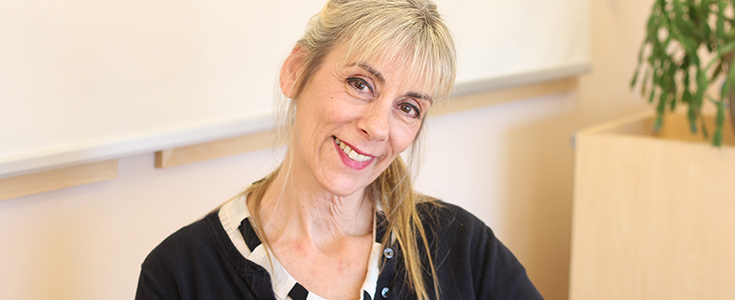Putting seniors In PRIME position
By Mike Daly
For Kim Solleveld, a 32-year nursing veteran specializing in gerontology, providing care for the elderly is an endeavor that never gets old.
"I find the elderly amazing," Solleveld says. "They are the wisest people I know. Their personalities, their stories . . . you will learn everything from them. They're amazing people."
Solleveld has spent her career at Deer Lodge Centre (DLC), most recently as a member of PRIME, a referral-based health centre program providing care for Winnipeg seniors whose chronic, complex health issues pose a risk of admission to personal care home, emergency departments or hospital. (PRIME is also offered out of Misericordia Health Centre.)
Clients visit between one and five times per week. After hours, in-home nursing is also available.
"PRIME is designed to keep the elder adult in their home setting for as long as possible," Solleveld says. "That's one of our biggest goals."
DLC's PRIME team of professionals includes doctors, nurses, physiotherapists, social workers, health care aides, occupational therapists, recreation facilitators, dieticians, pharmacists, rehabilitation assistants, receptionists and case managers. Together, they provide a holistic approach to care that's proven popular with the program's 180 clients - so much so that not even frigid temperatures in the depths of winter can keep clients away.
"When you have clients who, when it's -45 degrees outside, can't wait to get on the bus to come here, that speaks volumes about the efficacy and popularity of the program," Solleveld says. "In addition to meeting their health care needs, we provide a great social environment that helps keep them active and connected to their peers. It totally improves their quality of life."
Indeed, a quick tour of the facility, located on west side of DLC at 203 Duffield Street, might have visitors thinking "clubhouse" rather than "health care facility." Bright-eyed, cheerful clients routinely stop to chat with staff, or to share an activity or a meal with friends in the recreation room. Examination rooms and medical facilities are found only when one ventures down a sunlit hallway, past the closed-in patio, and a little deeper into the facility.
Appearances notwithstanding, PRIME is, at its heart, a health care centre dedicated to helping clients with complex medical, functional, cognitive and/or mental health issues.
"We have some very complex cases that we need to follow up with all the time," Solleveld says." It can be quite challenging, and the elderly are often difficult clients to assess. They often don't present the same signs and symptoms as younger people, and you have to have the ability to read between the lines.
"For example, if your elderly mother has a urinary tract infection, she might present differently than would you or I. Whereas you might have a burning sensation that would lead to a speedy diagnosis, your mother's symptoms might include a change in behaviour, or newfound signs of aggression. These might be easily be mistaken for an increase in dementia or depression. So our team has to be able to make the correct assessment."
Solleveld says that in addition to their professional training, the PRIME team relies on strong communication for their success.
"We're a fairly small team, so we have to be well-organized," she says. "We treat clients with diabetes, cardiac issues, Parkinson's, mobility issues, swelling issues, wounds . . . we care for them all. We care for the family, too, making sure that no one is left in the dark. If there is a change in condition, the family is notified."
Involving families also helps with a common problem associated with elder care: caregiver stress.
"We realize, especially amongst this clientele, that there is often caregiver stress. So, if having their loved one attend PRIME allows a daughter or another caregiver time to get their groceries, run errands or enjoy some downtime, that's a beautiful thing."
It all boils down to a simple raison d'etre.
"It's about enhancing quality of life, and knowing that we're here for our clients and their families," Solleveld says.
"When you know you've contributed to that goal, you go home knowing that you've made a difference. It's a great feeling."
Mike Daly is a communications specialist with the Winnipeg Regional Health Authority.

